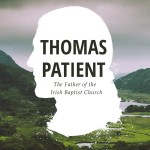Local autonomy has always been part of Baptist history, but so has cooperation. Throughout our history, local Baptist churches have been the ultimate authority for their own congregation. Baptist churches hire their own pastors. Baptist churches install their own Elders and Deacons. Baptist churches develop and approve their own budgets including making decisions about missions giving. However, we also have a history of cooperation with other churches. Typical Southern Baptist churches cooperate through local county associations, state conventions, and the national Southern Baptist Convention. These contemporary efforts are grounded in a history of cooperation found in the earliest Baptist churches. I have recently published a book about an early Baptist named Thomas Patient (HERE) who both planted the first Irish Baptist churches but also cooperated with other like-minded Baptist churches.
First London Confession of 1644
The seeds of a vision for cooperation were laid in Baptist’s early statements of faith. The earliest Particular Baptist confession of faith was the First London Confession of 1644. Seven churches came together to publish the confession in order to distinguish themselves from the Arminian Anabaptists and place them within the broader English Reformation. The confession was modeled after the Separatist Confession of 1596. The London Baptists confessed a biblical reformed faith. They also confessed congregational convictions as well as believer’s baptism by immersion. But, they also emphasized cooperation. Article XLVII of the First London Confession of 1644 states, “And although the particular Congregations be distinct and severall Bodies, every one a compact and knit Citie in it selfe; yet are they all to walk by one and the same Rule, and by all meanes convenient to have the counsell and help one of another in all needfull affaires of the Church, as members of one body in the common faith under Christ their onely head.”[1] Article XLVII of the First London Confession of 1644 is modeled heavily after the Separatist Confession of 1596’s Article 38. These seven churches actually modeled their convictions by publishing the confession. They were from different churches but were also committed to working together, therefore they needed to distinguish the doctrine that unified them. The First London Confession of 1644 became a tie that bound them together. Thomas Patient was one of the men who signed this early confession. Later he left London in order to spread the gospel in Ireland. Patient then ended up planting the first Baptist churches in Ireland.
5th Monarchist in Ireland
Thomas Patient went to Ireland as an army chaplain with Oliver Cromwell’s invading force. During the English Civil War the King had been executed and the Parliamentarian forces eventually made Oliver Cromwell their leader against the Royalist forces. The non-conformists like the Presbyterians, Independents, and Baptists sided with the Parliamentarians. However, as the war progressed a debate arose regarding Cromwell’s office. Some wanted to make him King, but most were strongly opposed to that title and that type of authority. Therefore, the Barebones Parliament in 1653 settled on an office of Lord Protector. However, many of the non-conformists were enraged by that title because God was their Lord Protector. Leaning on passages like Daniel 7 they argued their hope was in a messianic kingdom. Bell explains, “For many, the Protectorate looked uncomfortably similar to the monarchy that God had so recently called them to overthrow. The Saints were extremely dissatisfied.”[2] They believed elevating Cromwell to a title of Lord Protector would conflict with their allegiance to their heavenly king.
During these years Thomas Patient was in Ireland expanding the Baptist movement, but also remaining in cooperation with the other London Baptists. For example, he was a signer of a letter sent from the Irish Baptists on June 1, 1653 to the London Baptists. In the letter they suggested a national day of prayer, requested continued correspondence, asked for a list of other like-minded churches in London, and asked the London Baptists to send representatives to Ireland to help instruct their new Baptist churches. During these years the heat over the Lord Protector title continued to heat up. However, William Kiffen saw things differently. He had served as a pastor with Thomas Patient in London. Both had signed the First London Confession of 1644 representing their church. Kiffen simply saw the Protectorate as another government to appease in order to preserve religious tolerance. Therefore, he sent a letter to the Irish Baptists rebuking their criticism of Cromwell and pleading with them to submit to the Cromwellian government. In his letter Kiffen contended the Protectorate was both a legitimate government and had preserved the country from chaos.
Even though Kiffen was more influential than Patient he did not operate like a Catholic Pope demanding they defuse their heat. Rather, Kiffen approached them as a fellow Baptist and pastor seeking to persuade them to think differently about the implications of their criticism of Cromwell. Patient and the Irish Baptist heeded Kiffen’s admonition and their relationship with the Protectorate improved. The incident is a great example of loving correction, but also humble cooperation. Due to humble cooperation rather than authoritative mandates the fledging movement was able to avoid becoming too political and enabled them to improve their relationship with Cromwell.
Lessons for Contemporary Baptists
These types of historical accounts provide examples for Baptist today. W.T. Whitley explains, “from the beginning Baptists were not ‘Independents’; they always sought for fellowship between the different churches, and they were very successful in arranging for permanent organization.”[3] Even though Baptists should champion our convictions about local autonomy, we should also celebrate our convictions about cooperation. Torbet explains, “Their purpose was framed by a desire to have fellowship between local churches and to carry on evangelistic work.”[4] My role as pastor of Redeemer Church is first to the local church, but we also seek to be involved with the Denton Baptist Association. The DBA has supported the planting of our church and now we are working with the DBA to plant other churches. As Baptists our doctrine and history are to commit to the local autonomy of our church. However, our doctrine and history also call us to cooperate together to spread the gospel.
[1] William L. Lumpkin, Baptist Confessions of Faith (Valley Forge: Judson Press, 1969), 168-169.
[2] Mark R. Bell, Apocalypse How?: Baptist Movements During the English Reformation (Macon, Georgia: Mercer University Press, 2000), 153.
[3] W.T. Whitley, A History of British Baptists (London: Charles Griffin and Company, 1923), 53.
[4] Robert G. Torbet, A History of the Baptists, 3rd edition (Valley Forge: Judson Press, 1963), 43.





